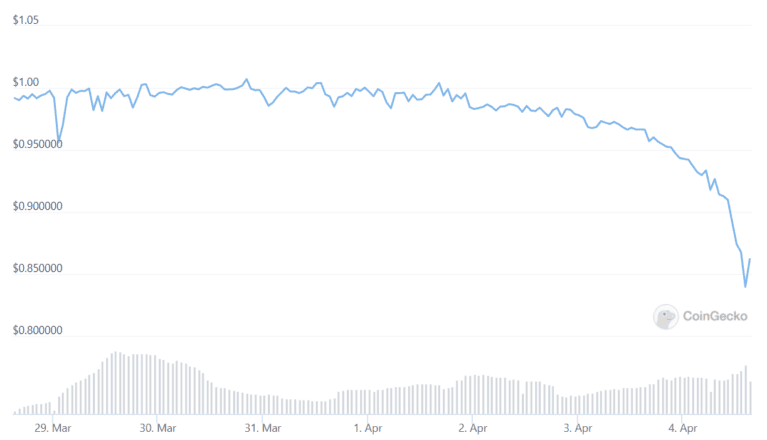Key Takeaways
- The flagship stablecoin of the Waves network, Neutrino USD, has depegged after rumors of “death spiral” risks began circulating on Twitter.
- USDN is currently trading around the $0.86 price mark.
- The WAVES token has lost over 30% or $1.8 billion in value over the last four days.
Share this article
After almost doubling its market capitalization in a few weeks, Waves’ Neutrino USD stablecoin has lost its peg, signaling a potential “death spiral” event for the ecosystem’s native token.
Neutrino USD Depeg Spells Trouble for Waves
Neutrino USD, the flagship stablecoin of the Waves ecosystem, is seeing its peg challenged amid short selling pressure on the ecosystem’s native token, WAVES. Neutrino USD (ticker: USDN) is meant to roughly follow the price of the U.S. dollar, but it’s currently worth around $0.86.
USDN lost its desired $1 peg last Friday after a scathing post by the pseudonymous crypto investor 0xHamZ began making rounds on Twitter. 0xHamZ called WAVES, the native token of the Waves network, the “biggest ponzi in crypto,” and claimed that the project’s founders had been artificially pumping the token’s value using leverage.
WAVES is the biggest ponzi in crypto
It has recklessly engineered price spikes by borrowing USDC at 35% to buy its own token
Continuous WAVES market cap growth is needed to keep the system stable
WAVES will eventually crash and USDN will break with it
You’re on notice🧵
— 0xHamZ (@0xHamz) March 31, 2022
Waves began making headlines in March after seeing its market capitalization surge almost sixfold in just over a month amid otherwise relatively shaky market conditions. Its principal use case is to mint and support USDN, which has likewise seen its market capitalization surge from around $500 million to an all-time high of over $960 million over the same period before losing around $130 million in value today.
USDN’s mechanism works similarly to MakerDAO‘s DAI, only it is overcollateralized and can only be minted using the WAVES token. The surging demand for USDN could be attributed to the large staking yields offered for the stablecoin on various DeFi platforms in the project’s ecosystem. However, 0xHamZ said that the high USDN staking yields were heavily dependent on the continuous growth of the collateral token, WAVES, and that the team had been “folding leverage” to engineer a supply squeeze to pump WAVES’ price artificially.
They also shared on-chain data to substantiate their claim, showing that the Waves team had been depositing USDN on the Waves-native money market protocol Vires Finance to borrow USDC, transferring the USDC to Binance to buy WAVES, and converting WAVES to USDN. The data showed that they repeated this process multiple times.

Soon after the rumor of Waves using leverage to prop up the value of their token broke out, USDN began sliding below its targeted $1 peg. Although it is overcollateralized by WAVES, USDN is currently trading around the $0.86 price range, showing little signs of recovery. The WAVES token has also erased over 30% or $1.8 billion in value, raising concerns of a potential “death spiral” event that could see the value of the WAVES collateral on the Neutrino protocol fall below the market capitalization of the USDN stablecoin. That would mean the system has become insolvent.
Founder Blames Alameda Research
In response to the rumors, Waves founder Sasha Ivanov blamed the renowned cryptocurrency trading firm Alameda Research for orchestrating an anti-Waves “FUD” campaign. “Get your popcorn ready: @AlamedaResearch manipulates $waves price and organizes FUD campaigns to trigger panic selling. I hope I caught your attention,” Ivanov said in a Sunday tweet storm.
Ivanov claimed that Alameda had borrowed WAVES on Vires Finance to short the asset and orchestrated the campaign on Twitter to trigger a sell-off and turn its trade profitable. “So what do we have here: They were the first to push the price on FTX, but after the position was closed with profit the subsequent short trade they opened failed, because the price kept going up,” he wrote. “Borrowing and FUD had to bring the price down and make the short profitable.”
Alameda founder and former CEO Sam Bankman-Fried dismissed Ivanov’s claims as a “bullshit conspiracy theory” without providing further details about the trading firm’s involvement with the incident.
Ivanov also posted a proposal to the Vires Finance DAO to “temporarily reduce the liquidation threshold for Waves and USDN borrowing to 0.1%” and limit the maximum borrow APR to 40%.
https://t.co/sZUh19dBNi New DAO proposal on https://t.co/X8GtUDr6fT
Let’s protect #waves ecosystem from greed!
GREED IS BAD.— Sasha Ivanov 🌊 (1 ➝ 2) (@sasha35625) April 3, 2022
The idea behind the proposal is to liquidate Alameda’s supposed short position and protect Waves’ long position by capping the borrowing rates for USDC and USDT. Setting higher borrow rates would mean that the team would have to make higher interest payments on its stablecoin loans, which it uses to support the price of WAVES.
The Waves team allegedly controls around 30% of the circulating supply of VIRES, meaning that it could heavily influence—if not singlehandedly decide—the outcome of the vote. However, if Ivanov’s proposal gets rejected, it could force the Waves team to unwind its leveraged long position on the Vires money market platform to service their debt. Following 0xHamZ’s warning post on Friday, the borrow APRs for the USDC and USDT pools on Vires jumped from around 34% to 80%, effectively more than doubling the interest Waves must pay on its loan, which is reportedly worth north of $400 million at press time.
Disclosure: At the time of writing, the author of this feature owned ETH and several other cryptocurrencies.

